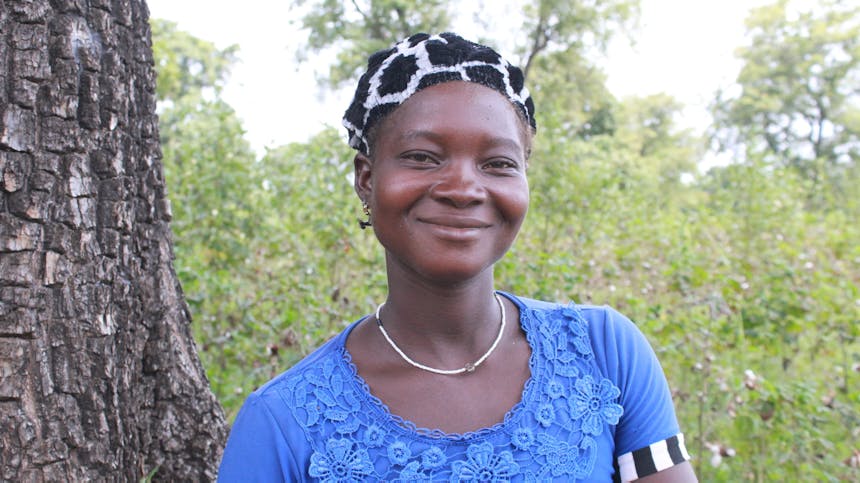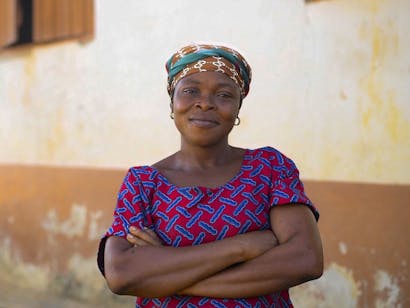Access to Finance and Capital
In this blog we put a spotlight on access to finance and capital, as part of our series on the five key components for successful enterprise development.

The global statistics speak for themselves when it comes to the importance of access to finance and capital for women entrepreneurs, with 80% of women owned businesses with credit needs being either unserved or underserved. Over the past six years, almost 270.000 women have been supported through CARE’s global Women in Enterprise programme, including through improved business conditions and access to funds and skills. One of the key components of our programming is opening up access to finance and capital for women entrepreneurs.
Watch the film about access to finance and capital:
Read the stories of Sékongo, María Julia, Basma & Sharmini who are featured in this film.
Bank accounts
Significant progress was made on access to finance for women entrepreneurs taking part in the programme, with bank account ownership more than doubling over three years across the seven countries. In Sierra Leone and Ivory Coast, this more than quadrupled. We also saw an increase in the adoption of mobile banking services, particularly in Sierra Leone where it rose from 4% to 31% and in Jordan where it increased from 0 to almost 20%. Despite this, financial exclusion remains a barrier and less than 50% of women from our programme have a bank account in Sierra Leone, Guatemala, Peru and Jordan.
Savings Groups
Through this programme, CARE has introduced thousands of women to the concept of collective saving, through our flagship Village Savings & Loans Associations (VSLAs), particularly in West Africa where 98% of programme participants are members of a VSLA. These groups, with no outside investment, are a safe way to save money and take out small loans, and have been the foundation for many micro enterprises. They are also often an important platform from which women can access more formal finance, such as savings accounts and credit products, including group loans. In Sri Lanka we saw an 82% increase in savings groups, with 75% of women entrepreneurs being members by the end of the programme. Savings groups have created group solidarity and strong saving habits.

Soro Naminata is a peanut and cotton farmer from Ivory Coast, she explains: “I now have my own bank account and I feel very strong and different from my life a few years ago.” Soro is a member of a VSLA and, through the group and training, Soro and her peers have learned how to better manage their income, she explains: “Previously, I would spend all my money meeting expenses as they arose, whether they were useful or not, and I found myself with no products and no money. Now I can prioritise my income and not waste any of the money I earn.”
CARE has also connected the group with the bank, Soro adds: “I now have my own bank account and I feel very strong and different from my life a few years ago. CARE encouraged us to build a good relationship with the bank for the future and to deposit the income we earn.”
Loans
Overall, the share of women entrepreneurs who have accessed a loan increased by 54.5% over three years. In Ivory Coast, this increased by over 80%. Loans tend to be used for start-up costs, purchasing equipment or procuring raw materials. The average size of loans accessed by women entrepreneurs increased moderately in most countries, from an average of 1.230 USD at baseline to 1.810 USD at endline. This is illustrative of the small size of most enterprises. Most women we work with cannot absorb larger loans of 10.000 USD and up, which is the typical loan sizes that formal financial institutions offer to small businesses. Hence our target group remains underserved by formal financial institutions. Repayments of loans were strong and by the end of the programme, an average 76% of participants had fully repaid their loans, with others on schedule to repay.
In Ivory Coast, CARE provided a revolving loan fund in partnership with Première Agence de Microfinance (PAMF), the largest microfinance provider in the country. This partnership enabled women to access lower interest loans that were larger than they would have been able to access through their savings group. 310 Ivorian women entrepreneurs have secured loans to grow their businesses and all are successfully repaying them. Building on this, CARE in Ivory Coast also partnered with pan-African commercial bank, Ecobank. This partnership enables low-income women who are members of VSLAs to open up their own personal accounts, as well as access group loans. Ecobank offers flexible repayment terms that acknowledge fluctuating income.
Soro’s VSLA was one of those that took out a group loan. With their loan they bought a huller, which speeds up the production process. She adds: “Before, we spent hours sitting and shelling the peanuts and we lost many customers. Now we have many satisfied customers.” Soro explains that every member is active in the repayment of the loan.
Multiple barriers still exist on access to finance including: conditions that are difficult to meet such as guarantors and collateral requirements; lengthy and daunting paperwork; fear of imprisonment or losing their house if they default; limited flexibility on loan repayment plans; and high interest rates. Partnering with financial institutions has been an effective way of opening up both new opportunities for small business owners, as well as new markets for financial providers. A focus on access to finance for enterprise programming remains essential.
CARE’s five key components for enterprise development with women:
- Strengthening skills
- Improving the business environment
- Engaging men and boys
- Facilitating access to finance and capital
- Encouraging the power of groups and networks



